What Are the Best AP Chemistry Textbooks and Prep Books?
4 min read•july 11, 2024
Dalia Savy
AP Chemistry 🧪
269 resourcesSee Units
The Best AP Chem Books📚
The AP Exam🕒
Let's help you find the perfect prep books and textbooks of your dreams 😴 But first, here is the format of the AP Chemistry Exam in May!
Section 1: Multiple Choice Questions (MCQ)
- You have 90 minutes to answer 60 MCQs.
- This will count as 50% of your total exam score.
- No calculator is permitted for this section of the exam so it will be more conceptual.
Section 2: Free Response Questions (FRQ)
- You have an hour and 45 minutes to answer 7 FRQs.
- There are three long essay questions, that are worth 10 points each and four short-answer questions, that are worth 4 points each.
- This section will also count as 50% of your total exam score.
- A calculator is permitted, so this is the section of the test where you will be asked to do most of the calculations.
If you need some tips with either of these sections, check out these guides:
📝Read: AP Chemistry - Multiple Choice Questions
📝Read: AP Chemistry - Free Response Questions
Best Textbooks
1) Chemistry (AP Edition) 10th Edition
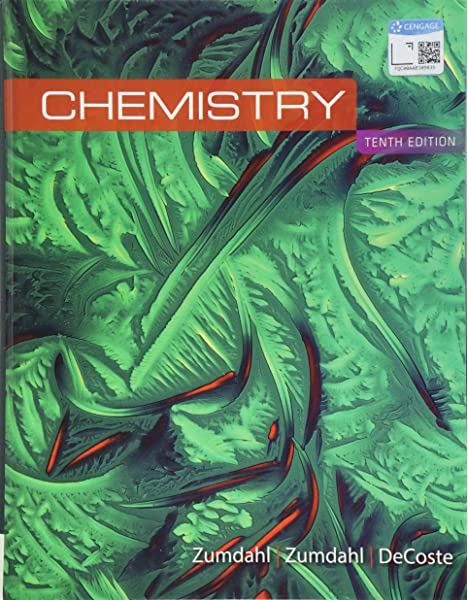
Image Courtesy of Amazon
This textbook is one of the most used ones for AP Chemistry. Your school might have the earlier edition but it works just as well! It is one of the textbooks on the list College Board provides.
Pros:
- Easy to read and comprehend 🧠
- Connects different ideas together really neatly
- Has questions throughout the chapter and runs you through them step by step ❓
- Lots of visuals and graphics 👀
- Tons of practice questions at the end of each chapter and AP style MCQs that you can complete to prepare for unit tests
Cons:
- Expensive compared to prep books and online textbooks 💰
- Answers to the practice questions at the end of each chapter aren't included in the book
2) Chemistry: The Central Science (14th Edition)
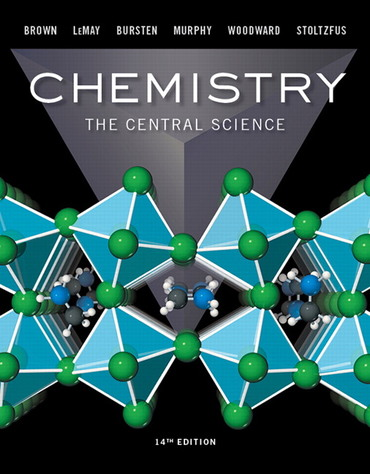
Image Courtesy of Pearson
This textbook is also on the list of example textbooks that College Board provided.
Pros:
- Very well explained content with illustrations 📈
- Tries to anticipate points of confusion and help you overcome them 💡
- Practice questions explained step by step ↕️
Cons:
- Expensive! More expensive than Zumdahl 💰
Both of these textbooks are perfect to prepare for the AP Chemistry Exam. Check with your school to see if they have any textbooks if you are self-studying before buying one💸.
Best Prep Books 📖
1) Princeton Review👑
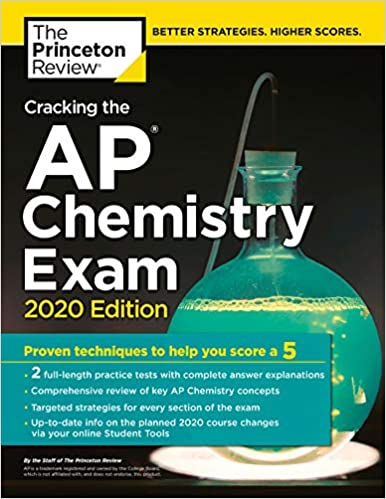
Image Courtesy of Amazon
Pros:
- All necessary content covered in depth
- Prioritizes more important content
- 2 practice exams are included with answers 📚
- If you buy the premium version for $3 more, there are 4 practice tests in the book and 1 online.
- Gives study tips and acronyms as you read 💡
- Provides practice multiple-choice questions and free-response questions at the end of each chapter ❓
Cons:
- Free-response questions are found to be worded weirdly 😕
- Doesn't explain math calculations well in the answer keys 😞
- Moderately expensive ($13 regular + $16 premium)
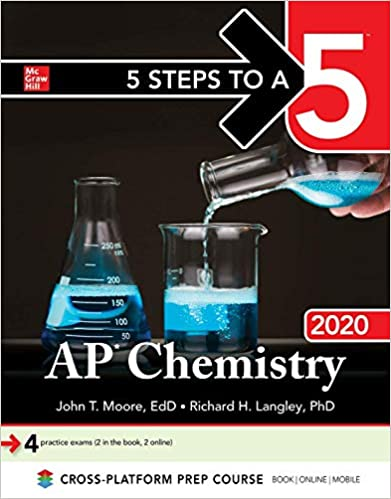
Image Courtesy of Amazon
Pros:
- Includes 2 practice exams in the book and 2 online
- Has an online prep course that you can access with your PC or phone 📱
- Their interactive online software has practice questions, a personalized study plan, practice tests, flashcards, and even a game center 🎮
- Includes a very structured study plan and a glossary
- With the elite version ($6 more), you have access to a section called "5 minutes to a 5️⃣." This includes 180 days of questions that will only take you 5 minutes! It's a quick and easy practice to keep you motivated 🙃
- Covers all content necessary and makes it concise
- Has a list of equations➕ at the beginning of a chapter and a bunch of practice questions at the end
Cons:
- The questions are slightly easy compared to what you actually see on the AP Exam
- Elite version ($19) is slightly more expensive than Princeton's premium version ($16) 💰
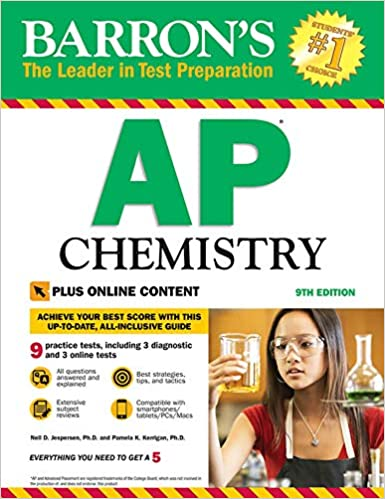
Image Courtesy of Amazon
Pros:
- Lots of practice tests to hone your exam skills ❓
- They also have an online portal to continue your studying on
- Makes it easy to see which topics need improvement with provided diagnostic tests
- Questions are harder than the ones on the AP 🤔
- If you get these right, you'll probably nail the AP questions
Cons:
- Isn't updated every year
- Overteaches the content and doesn't stick directly to the CED
- Is on the more expensive side ($18) 💸
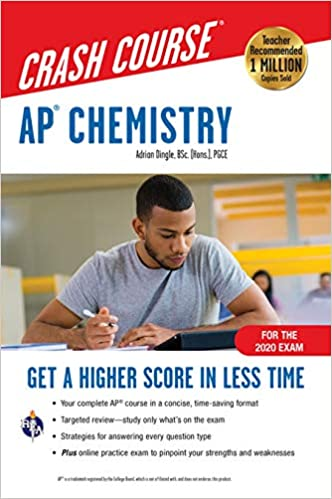
Image Courtesy of Amazon
Pros:
- Information is very compact and concise, making it a quick and easy read for review
- Focuses only on what you need to know to get a 5️⃣
- Perfect if you only have two weeks to study
- On the cheaper end ($9)
Cons:
- Doesn't include enough practice problems
- It is a little difficult to access the practice exams online 🖥️
- Isn't good to use throughout the year to get a solid foundation of knowledge of each unit. It is better for reviewing content you already know
Prep Book Awards 🏆
Best Overall Book🎉: 5 Steps to a 5
People that want a 5️⃣: 5 Steps to a 5 or Princeton
Best for Practice Tests❓: Barron's Prep
Best for Those that want More Knowledge🧠: Barron's Prep
Best Online Portal 🖥️: 5 Steps to a 5
People that need Structure📅: 5 Steps to a 5
If you have Limited time⏰: Crash Course
Closing Thoughts
Try to choose the prep book that suits your learning style and the amount of effort you want to put into studying. Buy something you know you'll wanna read and look through the pros and cons before spending the money.
Happy studying! 🎉
Browse Study Guides By Unit
⚛️Unit 1 – Atomic Structure & Properties
🤓Unit 2 – Molecular & Ionic Bonding
🌀Unit 3 – Intermolecular Forces & Properties
🧪Unit 4 – Chemical Reactions
👟Unit 5 – Kinetics
🔥Unit 6 – Thermodynamics
⚖️Unit 7 – Equilibrium
🍊Unit 8 – Acids & Bases
🔋Unit 9 – Applications of Thermodynamics
🧐Exam Skills
📚Study Tools

Fiveable
Resources
© 2025 Fiveable Inc. All rights reserved.